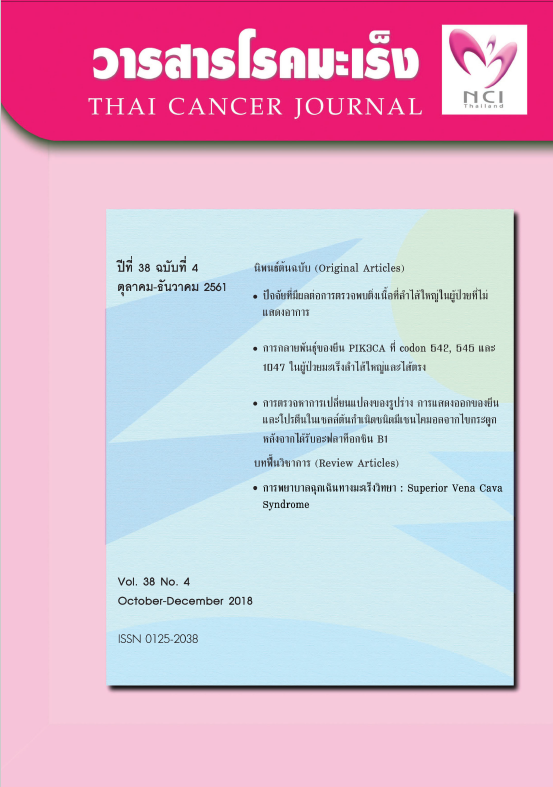PIK3CA Mutation at Codons 542, 545, and 1047 in Colorectal Cancer Patients
Keywords:
PIK3CA mutation, colorectal cancer, clinicopathological characteristicsAbstract
Previous studies have suggested that PIK3CA mutations might help predict the prognosis and anti-EGFR drug response of colorectal cancer patients. This study aimed to detect PIK3CA mutations and compare the relationship between these mutations and the clinical characteristics of the patients (age at diagnosis, sex, tumor size, stage, histological grade, histological type, and lymph-node metastasis). PIK3CA mutations were examined by PNA-mediated real-time PCR clamping among 206 colorectal cancer patients who had undergone operations at the National Cancer Institute. PIK3CA mutations were detected in five samples (3%), of which mutations were found in exon 9 that translated the helical domain. From these five samples, two (40%) showed mutation at codon 542 and the other three (60%) showed mutation at codon 545/546. However, no mutation was found at codon 1047 in exon 20 (kinase domain). In addition, PIK3CA mutation at codon 542 was found mostly in tumor sizes > 5 cm. and mainly in the mucinous type (P = 0.029 and 0.004, respectively). No correlation between PIK3CA mutation at codon 542 and exon 9 and the clinical characteristics of the patients, was found.
References
Imsamran W, Chaiwerawattana A, Wiangnon S, Pongnikorn D, Suwanrungrung K, Sangrajrang S, Buasom R. Cancer In Thailand vol VIII 2010-2012 Ministry of Public Health. Bangkok, 2015.
Sargent DJ, Wieand HS, Haller DG, Gray R, Benedetti JK, Buyse M, et al. Disease- free survival versus overall survival as a primary end point for adjuvant colon cancer studies: individual patient data from 20,898 patients on 18 randomized trials. J Clin Oncol 2005;23:8664-70.
Amado RG, Wolf M, Peeters M, Van Cutsem E, Siena S, Freeman DJ, et al. Wild-type KRAS is required for panitumumab efficacy in patients with metastatic colorectal cancer. J Clin Oncol 2008;26:1626-34.
Allegra CJ, Jessup JM, Somerfield MR, Hamilton SR, Hammond EH, Hayes DF, et al. American Society of Clinical Oncology provisional clinical opinion: testing for KRAS gene mutations in patients with metastatic colorectal carcinoma to predict response to antiepidermal growth factor receptor monoclonal antibody therapy. J Clin Oncol 2009;27:2091-6.
Sartore-Bianchi A, Martini M, Molinari F, Veronese S, Nichelatti M, Artale S, et al. PIK3CA mutations in colorectal cancer are associated with clinical resistance to EGFR-targeted monoclonal antibodies. Cancer Res 2009;69:1851-7.
Perrone F, Lampis A, Orsenigo M, DiBartolomeo M, Gevorgyan A, Losa M, et al. PI3KCA/PTEN deregulation contributes to impaired responses to cetuximab in metastatic colorectal cancer patients. Ann Oncol 2009;20:84-90.
Sood A, McClain D, Maitra R, Basu-Mallick A, Seetharam R, Kaubisch A, et al. PTEN gene expression and mutations in the PIK3CA gene as predictors of clinical benefit to anti-epidermal growth factor receptor antibody therapy in patients with KRAS wild-type metastatic colorectal cancer. Clin Colorectal Cancer 2012;11:143-50.
Fruman DA, Meyers RE, Cantley LC. Phosphoinositide kinases. Annu Rev Biochem 1998;67:481507.
Karakas B, Bachman KE, Park BH. Mutation of the PIK3CA oncogene in human cancers. BJC 2006; 94:455-9.
Volinia S, Hiles I, Ormondroyd E, Nizetic D, Antonacci R, Rocchi M, et al. Molecular cloning, cDNA sequence, and chromosomal localization of the human phosphatidylinositol 3-kinase p110 alpha (PIK3CA) gene. Genomics 1994;24:472-7.
Bader AG, Kang S, Vogt PK. Cancer-specific mutations in PIK3CA are oncogenic in vivo. PNAS 2006; 103:1475-9.
Ma YY, Wei SJ, Lin YC, Lung JC, Chang TC, WhangPeng J, et al. PIK3CA as an oncogene in cervical cance. Oncogene 2000;19:2739-44.
Migozuchi M, Nutt CL, Mohapatra G, Louis DN. Genetic alterations of phosphoinositide 3-kinase subunit genes in human glioblastomas. Brain Pathol 2004;14:372-7.
Pedrero JMG, Carracedo DG, Pinto CM, Zapatero AH, Rodrigo JP, Nieto CS, et al. Frequent genetic and biochemical alterations of the PI 3-K/AKT/PTEN pathway in head and neck squamous cell carcinoma. Int J Cancer 2005;114:242-8.
Nosho K, Kawasaki T, Ohnishi M, Suemoto Y, Kirkner GJ, Zepf D, et al. PIK3CA mutation in colorectal cancer: relationship with genetic and epigenetic alterations. Neoplasia 2008;10:534-41.
Markman B, Atzori F, Pérez-García J, Tabernero J and Baselga J, et al. Status of PI3K inhibition and biomarker development in cancer therapeutics. Ann Onco 2009;21:683-91.
Zhao L, Vogt PK. Class I PI3K in oncogenic cellular transformation. Oncogene 2008;27:5486-96.
Huang CH, Mandelker D, Schmidt-Kittler O, Samuels Y, Velculescu VE, Kinzler KW, et al. The structure of a human p110alpha/p85alpha complex elucidates the effects of oncogenic PI3Kalpha mutations. Science 2007;318:1744-8.
Naguib A, Cooke JC, Happerfield L, Kerr L, Gay LJ, Luben R, et al. Alterations in PTEN and PIK3CA in colorectal cancers in the EPIC Norfolk study: associations with clinicopathological and dietary factors. BMC Cancer 2011;11:123
Barault L, Veyrie N, Jooste V, Lecorre D, Chapusot C, Ferraz JM, et al. Mutations in the RAS-MAPK, PI(3)K (phosphatidylinositol-3-OH kinase) signaling network correlate with poor survival in a populationbased series of colon cancers. Int J Cancer 2008; 122:2255-9.
Ogino S, Nosho K, Kirkner GJ, Shima K, Irahara N, Kure S, et al. PIK3CA mutation is associated with poor prognosis among patients with curatively resected colon cancer. J Clin Oncol 2009;27:1477-84.
Iida S, Kato S, Ishiguro M, Matsuyama T, Ishikawa T, Kobayashi H, et al. PIK3CA mutation and methylation in fluences the outcome of colorectal cancer. Oncol Lett 2012;3:565-70.
Phipps AI, Makar KW, Newcomb PA. Descriptive profile of PIK3CA-mutated colorectal cancer in postmenopausal women. Int J Colorectal Dis 2013;28: 1637-42.
Liao X, Lochhead P, Nishihara R, Morikawa T, Kuchiba A, Yamauchi M, et al. Aspirin use, tumor PIK3CA mutation, and colorectal-cancer survival. N EnglJ Med 2012;367:1596-606.
Hsieh LL, Er TK, Chen CC, Hsieh JS, Chang JG, Liu TC. Characteristics and prevalence of KRAS, BRAF, and PIK3CA mutations in colorectal cancer by highresolution melting analysis in Taiwanese population. Clin Chim Acta 2012;413:1605-11.doi:10.1016/ j.cca.2012.04.029
Mouradov D, Domingo E, Gibbs P, Jorissen RN, Li S, Soo PY, et al. Survival in stage II/III colorectal cancer is independently predicted by chromosomal and microsatellite in stability, but not by specific driver mutations. Am J Gastroenterol 2013;108:178593.
Downloads
Published
Issue
Section
License
บทความทีตีพิมพ์ในวารสารโรคมะเร็งนี้ถือว่าเป็นลิขสิทธิ์ของมูลนิธิสถาบันมะเร็งแห่งชาติ และผลงานวิชาการหรือวิจัยของคณะผู้เขียน ไม่ใช่ความคิดเห็นของบรรณาธิการหรือผู้จัดทํา







